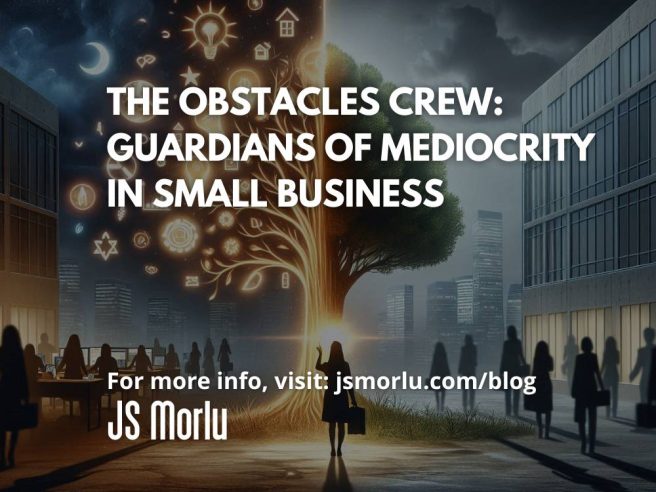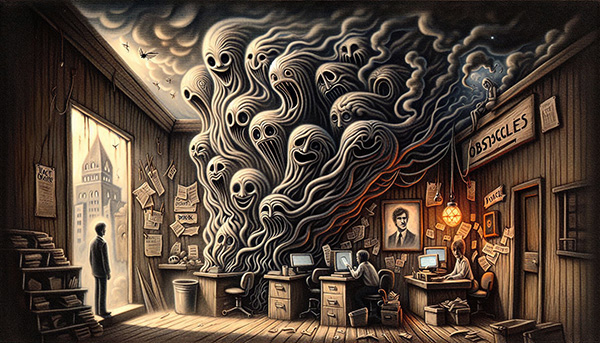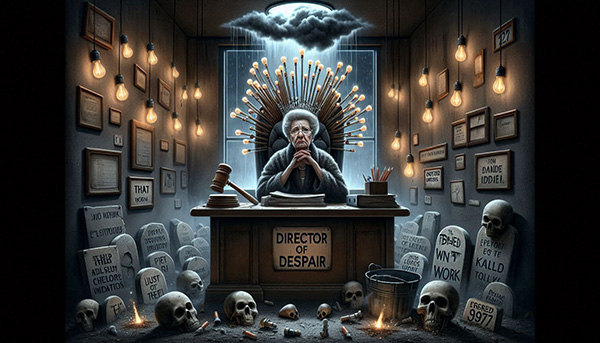By: John S. Morlu II, CPA
Introduction: Welcome to Obstacle Inc.
Meet Obstacle Inc., a small, family-owned business tucked away in the quiet, unassuming town of Nowhereville. Founded 20 years ago by Jack Spark, a man overflowing with optimism and the belief that small businesses could be the catalysts for global change. Jack’s dream was as ambitious as it was clear: transform Obstacle Inc. into a thriving, innovative company that would ignite growth in Nowhereville and turn it from a sleepy backwater into a bustling business hub. He believed in innovation, growth, and the unshakable power of small enterprises to change the world.
But while Jack had big dreams, he hadn’t anticipated one of the most powerful forces that exists in nearly every small business—the Obstacles Crew. These employees weren’t just a speed bump on the road to success; they were a full-blown blockade. Like stubborn weeds in a once-promising garden, they quietly took root, choking out any attempt at innovation before it could even sprout. They saw their role as keeping the business grounded, and by grounded, they meant stuck—buried under the weight of doubt, fear, and endless negativity.
The Obstacles Crew wasn’t just a collection of grumpy employees; they were masters of pessimism, relentless naysayers who could foresee failure in even the most promising ideas. They were experts at shooting down new initiatives with phrases like, “That’ll never work,” or, “We’ve always done it this way.” To them, change was a dirty word, and progress was something to be avoided at all costs. They ruled Obstacle Inc. with an iron grip, suffocating every fresh idea before it had a chance to take off.
For years, this pervasive negativity held Obstacle Inc. in a stranglehold. Jack’s dreams of growth and transformation seemed further away with each passing day. It was as if the very people he trusted to help him realize his vision were actively working against him, shackling the company to mediocrity.
But then came Olivia.
Olivia wasn’t like the others. She was bold, unafraid of change, and, most importantly, armed with facts, data, and an unwavering belief that the future could be different. Olivia didn’t just walk into Obstacle Inc.; she shook things up. With her arrival, everything changed.
This is the story of how one woman, armed with a clear vision and a refusal to accept the status quo, transformed a company—and how every small business, no matter how stuck or stagnant, can find its own Olivia to unlock the potential for greatness.
Meet the Obstacles Crew: Dream Crushers Extraordinaire
Welcome to Obstacle Inc., a small, family-owned business nestled in the humble town of Nowhereville. Founded 20 years ago by the ever-optimistic Jack Spark, the company’s origin was rooted in hope, innovation, and a belief in the transformative power of small businesses. Jack dreamed of turning Obstacle Inc. into a beacon of success, an engine that would propel Nowhereville from a sleepy town into a bustling hub of commerce.
But Jack hadn’t foreseen the formidable force lurking within every small business—the Obstacles Crew. These aren’t your typical employees. They are the dream crushers, the pessimists, the protectors of the status quo who suffocate progress with their skepticism, fear of change, and relentless negativity. Like barnacles on a ship, they cling to the hull of innovation, dragging it down into the murky depths of stagnation.
So, who are these shadowy figures pulling the strings behind Obstacle Inc.’s stagnation? Let’s meet the players in this all-too-familiar saga—the Obstacles Crew, dream smashers extraordinaire.
1. Doubting Debbie – Director of Despair
Doubting Debbie is the captain of the crew, the leader in the art of shutting down progress before it even gets started. Her official role might be something more mundane, like Operations Manager, but make no mistake—her real title is Director of Despair. Debbie’s unmatched superpower is her ability to extinguish the spark of innovation with a simple, soul-crushing phrase: “That won’t work.”
With her vast reservoir of outdated anecdotes, Debbie has spent two decades expertly dismissing every new idea before anyone even gets a chance to debate its merits. Her reasoning is flawless in her own eyes: “We tried something similar in ’97, and it failed miserably. Why risk it again?” She holds a PhD in pessimism and her trophy room is filled with the dreams she’s buried.
Fun fact: Debbie’s most famous line, “It’s not worth the risk,” has killed more business ideas than any actual market force ever could.
2. Negative Ned – Prophet of Doom
Where Debbie leaves off, Negative Ned steps in. As her right-hand man and the Prophet of Doom, Ned has mastered the art of catastrophic predictions. With a deep frown permanently etched into his face, Ned’s talent is seeing impending disaster in every glimmer of opportunity. His contribution to every meeting is the same: “We’ll go bankrupt,” “Our competitors will destroy us,” or the infamous, “This will ruin us.”
Ned’s skill is turning optimism into anxiety. Present him with a bold new idea, and he’ll counter with wild predictions of financial collapse, client revolt, or even natural disasters. His favorite phrase, “It’s a gut feeling,” is his irrefutable argument, as though his pessimism is powered by some divine insight into the universe.
Fun fact: Once, when someone suggested expanding into a new market, Ned declared, “The economy is going to crash tomorrow.” Four years later, the economy was still standing, but the expansion idea wasn’t.
3. Fearful Fred – Czar of Comfort Zones
Fearful Fred is the quiet member of the crew, but his influence runs deep. He’s the Czar of Comfort Zones, a man who believes that the best course of action is to do absolutely nothing. Fred’s motto? “If it ain’t broke, don’t fix it.” His greatest fear is change—any change. To Fred, growth is not an opportunity but a threat, and any innovation is akin to walking a tightrope over a pit of doom.
Fred is the voice that reminds everyone that what they’ve been doing for the last 20 years has worked, so why bother with something new? He doesn’t argue loudly, but his persistent whispers of caution manage to stifle ambition. Every time a new strategy is proposed, Fred’s timid voice cuts through the room: “But what if it makes things worse?”
Fun fact: Fred is still convinced that social media is a passing fad. His last marketing strategy? Flyers under car windshield wipers.
4. Cynical Cindy – Vice President of Skepticism
Cynical Cindy brings intellectual weight to the Obstacles Crew. She doesn’t just disagree—she crafts elaborate, logical-sounding arguments that make even the most optimistic team member second-guess themselves. Cindy is the Vice President of Skepticism, a master at turning every idea into a business case for failure.
Once, when someone proposed a new product line, Cindy’s counter-argument spanned everything from market saturation to obscure geopolitical risks, complete with cherry-picked statistics and jargon-heavy explanations. By the end, no one could quite remember why they thought the idea had merit in the first place. Cindy’s skill is making doom sound like the most reasonable option.
Fun fact: Cindy once convinced the team that offering a 10% holiday discount would lead to the collapse of the entire local economy.
5. Lazy Larry – Chief of Can’t Be Bothered
Lazy Larry is the silent killer of progress. His official title might be something mundane, like “Project Manager,” but his real role is Chief of Can’t Be Bothered. Larry doesn’t actively oppose change; he just never follows through on anything. His method of sabotage is simple: agree to everything, but do nothing.
Larry’s favorite phrase is, “I’ll get to it later,” which, in Larry’s world, means never. He has perfected the art of looking busy while achieving nothing. Larry once spent six months working on changing the company’s email signature. Spoiler: the project remains unfinished.
Fun fact: Larry has had an “urgent” email sitting unread in his inbox for four years, and he’s still “getting to it.”
In every small business, there lurks an Obstacles Crew—those dream-crushers, progress stiflers, and purveyors of pessimism. At Obstacle Inc., the crew has thrived for two decades, but the tides are shifting. Can innovation and ambition finally break through their iron grip, or will the Obstacles Crew remain victorious in their war on change? Only time will tell.
Fun Facts About Failure: A Guide from the Obstacles Crew
The Obstacles Crew has been hard at work for years, making sure Obstacle Inc. stays exactly where it belongs—comfortably stagnant. To celebrate their unique talents, they’ve compiled a list of “fun facts” that they believe will help you understand why your dreams are better left as fantasies. Without further ado, here are some of their favorite facts about failure!
1. 80% of Small Businesses Fail Within the First Five Years
Cynical Cindy has turned this fact into her personal anthem. Sure, Obstacle Inc. has inexplicably been in business for 20 years, but Cindy doesn’t let that get in the way of her pessimism. She’ll remind everyone, at every opportunity, that this statistic is gospel—even if Obstacle Inc. somehow defies the odds daily.
2. People Hate New Things
Fearful Fred has built his entire career around this gem of wisdom. Whether it’s the internet, electric cars, or smartphones, Fred is convinced that the world is allergic to anything new. He often reminisces about the time he successfully killed a proposal for a company website by claiming “the internet is just a fad.”
3. The World is Unpredictable
Negative Ned lives by this rule. For him, the world is a giant pit of chaos, and the only thing predictable is that everything will go wrong. His favorite phrase? “Why bother planning? We’re all doomed anyway.” He frequently points out that every time someone plans anything at Obstacle Inc., it rains the next day. Coincidence? Not to Ned.
4. Hard Work is Overrated
Lazy Larry has a firm belief: success is just a lucky break away, so why bother putting in the effort? He’s famous for saying, “Google started in a garage, so technically, you’re already halfway there just by sitting around and waiting for luck to strike.” Larry enjoys reminding everyone that since luck is unpredictable, procrastination is the only sensible course of action.
5. “We Tried That Once, and It Didn’t Work”
Doubting Debbie brings this to every brainstorming session like a broken record. Whether the idea was tried in 1995 under completely different circumstances or whether it was just a half-hearted attempt, it doesn’t matter. If it didn’t work once, in Debbie’s mind, it’s destined to fail forever.
The Spark of Hope: Could Obstacle Inc. Escape the Obstacles Crew?
Despite the Obstacle Crew’s best efforts to stifle innovation, hope might just be on the horizon. Enter Optimistic Olivia, the newest member of the team, armed with enthusiasm and an unbreakable belief in possibilities. Fresh from business school and blissfully unaware of the toxic quicksand she’s walking into, Olivia sees potential where others see problems.
Olivia’s Secret Weapon? Data.
Unlike her predecessors, Olivia doesn’t just have ideas—she has evidence. Armed with spreadsheets, case studies, and a bottomless pit of optimism, she’s ready to battle the Obstacles Crew on their own turf. When Cynical Cindy starts spinning her usual doom-laden predictions about market trends, Olivia counters with actual market research and growth projections. Cindy, for the first time in years, is temporarily speechless.
The Showdown: Olivia vs. The Obstacles Crew
At her first team meeting, Olivia proposes a bold new marketing strategy. The Obstacles Crew collectively smirks, ready to pounce.
- Doubting Debbie leans in, preparing her signature “That’ll never work” line, but Olivia cuts her off with a presentation showing case studies of similar companies that grew 40% with similar strategies. Debbie blinks, stunned.
- Negative Ned starts to prophesy doom, muttering something about economic collapse, but Olivia comes prepared with risk management strategies and a backup plan. Ned slumps in his chair, defeated—for now.
- Fearful Fred timidly raises a hand to suggest “people don’t like change,” but Olivia swiftly shows consumer data highlighting how change drives growth. Fred, flustered, retreats into silence.
- Even Lazy Larry, usually impervious to enthusiasm, is caught off guard. He attempts his usual, “I’ll get to it later,” but Olivia’s project timeline is so clear, he has no choice but to agree. Begrudgingly.
The Verdict: Will the Obstacles Crew Survive?
The Obstacles Crew isn’t gone—yet. They’re wounded, but they’ll need more than just one round with Olivia to knock them out entirely. However, for the first time in decades, Jack Spark sees a glimpse of what Obstacle Inc. could be—a thriving company, free of the weight of fear and negativity. Could Optimistic Olivia finally be the spark that lights the fire of success?
Only time will tell. But one thing’s for sure: while the Obstacles Crew still lingers in the halls of Obstacle Inc., their days might just be numbered.
The Turning Point: Enter Optimistic Olivia
After years of stagnation, a change was brewing at Obstacle Inc. Jack Spark, once the vibrant and visionary leader, had grown tired of watching his company remain stuck in neutral. He was ready for something new, and that something arrived in the form of Optimistic Olivia—a fresh face with bright ideas, infectious enthusiasm, and a love for data.
Olivia was hired as a marketing executive, but from the moment she stepped into the office, it was clear she was no ordinary employee. Olivia believed in the power of facts, research, and hard evidence. She wasn’t interested in vague anecdotes or unsubstantiated claims of failure. If someone was going to reject her ideas, they would need to back it up with data—and they would need to provide a solid, persuasive alternative.
Her first encounter with the Obstacles Crew occurred at her very first meeting. She suggested launching a new product line aimed at millennials—a demographic they had completely ignored for years. Predictably, the crew sprang into action.
- Debbie: “That won’t work. Millennials aren’t interested in what we sell.”
- Ned: “We’ll go bankrupt trying. I can already see the company closing its doors.”
- Fred: “It’s too risky! What if people don’t like change?”
- Cindy: “There’s no evidence to support that launching this product would increase our sales. Besides, our current product line is already saturated in the market.”
Olivia remained calm. She had anticipated the pushback, but unlike most people who crumbled in the face of the Obstacles Crew’s pessimism, Olivia came prepared.
“Actually,” Olivia began, flipping through a meticulously compiled report, “Millennials are the fastest-growing consumer demographic in our industry. Research from XYZ Market Insights shows that 75% of millennials prefer brands that offer sustainable and locally-sourced products—precisely what we’re planning to offer with this new line. Here are case studies from three companies that implemented similar strategies and saw a 30% increase in sales over 18 months.”
The room fell silent. Debbie, for the first time in her career, was speechless. Cindy fumbled through her notes, trying to find data to refute Olivia’s claims, but came up empty-handed. Fred shrank in his chair, and Larry, sensing he might be asked to do something, quietly slipped out of the room.
Olivia continued. “And if this initiative doesn’t feel right for us at the moment, I’d be happy to discuss alternatives. For instance, we could try a smaller-scale pilot program, targeting a specific subset of our market to gather feedback before a full launch. But doing nothing, in today’s fast-evolving market, is the greatest risk we can take.”
Jack Spark was thrilled. Finally, someone was shaking things up.
A New Era of Accountability: The Fall of the Obstacles Crew
Jack, emboldened by Olivia’s bold approach, decided to make a change. From that point forward, anyone in the company who rejected a new idea would be required to back up their rejection with hard evidence. No more vague statements or “gut feelings.” Every objection had to be supported by data, and most importantly, any rejection had to be followed by a well-thought-out, persuasive alternative.
The rules were simple:
1. If you say no, you must show your work.
Opinions are fine, but they need to be backed up by facts, research, or data.
2. No rejection without a solution.
It’s not enough to say something won’t work. You have to present an alternative that’s just as good, if not better.
The Obstacles Crew struggled under the new regime. Debbie’s constant negativity no longer held any weight, as she couldn’t provide a shred of evidence to support her claims. Ned’s disaster predictions were met with polite requests for data, which he didn’t have. Fred was forced out of his comfort zone and had no choice but to accept that change was inevitable. And Larry, well—Larry eventually resigned. He couldn’t handle the pressure of being expected to contribute meaningfully to the company’s success.
Olivia, meanwhile, thrived. Under her leadership, Obstacle Inc. began to experiment with new ideas, test out new products, and explore untapped markets. Sales grew, profits rose, and Jack Spark’s original dream of turning Nowhereville into a business hub was finally coming true.
Every Small Business Needs an Olivia
The story of Obstacle Inc. is a familiar one. In every small business, there are employees like the Obstacles Crew—people who, whether out of fear, cynicism, or laziness, hold the company back from reaching its full potential. But as Olivia showed, success in business isn’t about avoiding risks or rejecting change; it’s about embracing new ideas with open eyes, supported by facts, data, and evidence.
Olivia wasn’t just a breath of fresh air—she was a beacon of accountability. Olivia believed in the power of rational decision-making, and she infused that belief into the very fabric of Obstacle Inc. She didn’t see rejection or skepticism as inherently bad; in fact, she encouraged healthy debate and critical thinking. What she did challenge, however, was the knee-jerk negativity that stifled progress and innovation. In her view, every business needed a champion who, like her, believed in the cause and was willing to back it up with solid evidence or suggest equally viable alternatives.
The Transformation: Growth Fueled by Facts and Solutions
As the Obstacles Crew began to fade from the company’s operations, a new culture started to take root. Employees no longer feared that their ideas would be shot down with a quick, unsubstantiated “no.” Instead, they knew that their ideas would be taken seriously, as long as they were well thought out and backed by data.
Jack Spark couldn’t have been happier. His company, which had been stuck in neutral for so long, was now a beacon of innovation. The transformation didn’t happen overnight, but as the months went by, Obstacle Inc. went from a company bogged down by stagnation to a growing business that embraced calculated risks and new opportunities. Revenues started to increase, customer satisfaction improved, and employees were more motivated than ever.
In one particularly telling moment, during a strategy meeting, an employee named Innovative Imani proposed launching an e-commerce platform—a bold idea for a company that had never ventured into online sales before. The old Obstacles Crew would have squashed this idea immediately, declaring that “our customers aren’t online” or “we don’t have the technical expertise”. But under Olivia’s influence, the room had changed.
Imani presented her proposal with data. She showed that over 60% of their potential customers were active online shoppers and that competitors had successfully increased their sales by adding e-commerce. She also presented a cost-effective plan for outsourcing the technical development to a third-party provider.
Instead of instant dismissal, the group engaged in a constructive discussion. There were concerns, of course, but each one was met with Olivia’s now-famous mantra: “Great—what’s the alternative?” Instead of letting fear stop them in their tracks, the team brainstormed potential challenges and ways to overcome them. In the end, the decision was made to move forward with a pilot program.
Six months later, the e-commerce platform launched, and it was an overwhelming success. Sales surged, and the business expanded its reach beyond Nowhereville. Imani’s idea, once a seemingly risky venture, had become a cornerstone of the company’s future.
The Impact of Olivia’s Leadership
Olivia’s influence didn’t just affect the decision-making process; it reshaped the entire company culture. Employees were empowered to think critically and creatively. They knew that their contributions mattered, as long as they were prepared to defend their ideas with facts, research, and data. Rejection, once a death sentence for new ideas, became part of the process—no longer a barrier, but a stepping stone toward refinement and success.
Even Jack, who had once felt trapped by the weight of his own employees’ negativity, became rejuvenated. He saw the company’s growth as proof that his vision from all those years ago was not misplaced. What had changed wasn’t the market or the products, but the willingness to embrace new opportunities in a smart, evidence-based way.
As Obstacle Inc. grew, they expanded into new markets, introduced new product lines, and became a model for other small businesses looking to break free from the constraints of pessimism. Olivia had proven that with the right mindset—and the right demand for accountability—any small business could turn its fortunes around.

Lessons from Obstacle Inc.: Every Business Needs an Olivia
The story of Obstacle Inc. offers valuable lessons for any small business struggling to innovate or grow. Every business, no matter its size or industry, will inevitably face its own version of the Obstacles Crew—people who, whether out of fear, laziness, or a genuine lack of belief in the business’s potential, hold back progress.
But Olivia’s story reminds us that the key to overcoming these obstacles isn’t necessarily about forcing people to change their mindset overnight. It’s about creating a culture of accountability, where decisions—whether they’re approvals or rejections—are based on facts, data, and thoughtful consideration. In such a culture:
- Rejection isn’t a dead end; it’s a chance to improve. The idea that something “won’t work” is only valuable if it comes with evidence and a solid alternative.
- Data-driven decisions lead to progress. When employees and management are encouraged to back up their claims with hard facts, the company is better equipped to make informed, strategic moves.
- Pessimism alone isn’t enough. Healthy skepticism is important, but it needs to be balanced with constructive solutions. Saying “no” should always be followed by “here’s what we could try instead.”
Olivia’s insistence on facts, data, and evidence transformed Obstacle Inc., but the truth is, every small business needs an Olivia—a champion who believes in the mission, who doesn’t shy away from challenges, and who can inspire others to think critically and creatively. Whether it’s in product development, marketing strategies, or internal processes, having someone who pushes for accountability and evidence-based decision-making can make the difference between stagnation and growth.
The Legacy of Obstacle Inc.: A Culture of Solutions
As Obstacle Inc. continued to thrive, the once-dominant Obstacles Crew became little more than a distant memory. The company’s new mantra, coined by Olivia, had become:
“If you reject it, provide a reason. If you provide a reason, offer a solution.”
The legacy of Obstacle Inc. is more than just a small business success story. It’s a reminder that growth and innovation don’t happen by accident. They require intentional effort, an openness to new ideas, and a commitment to evidence-based decision-making.
Every small business, no matter how stuck it might feel, has the potential to turn things around. The key is to foster a culture where ideas are valued, skepticism is welcomed—but only when it’s constructive—and every rejection is followed by an equally appealing and doable alternative.
In the end, every small business needs an Olivia. Someone who believes in the cause, challenges the naysayers, and insists that facts, data, and evidence are the cornerstones of success. It’s not just about having good ideas; it’s about building a culture that values accountability, embraces change, and drives the business forward with confidence and clarity.
As for Jack Spark, he couldn’t be prouder of the transformation at Obstacle Inc. And whenever a fellow small business owner asked him for advice on dealing with their own version of the Obstacles Crew, he’d simply smile and say, “Find your Olivia.”
Author: John S. Morlu II, CPA is the CEO and Chief Strategist of JS Morlu, leads a globally recognized public accounting and management consultancy firm. Under his visionary leadership, JS Morlu has become a pioneer in developing cutting-edge technologies across B2B, B2C, P2P, and B2G verticals. The firm’s groundbreaking innovations include AI-powered reconciliation software (ReckSoft.com) and advanced cloud accounting solutions (FinovatePro.com), setting new industry standards for efficiency, accuracy, and technological excellence.
JS Morlu LLC is a top-tier accounting firm based in Woodbridge, Virginia, with a team of highly experienced and qualified CPAs and business advisors. We are dedicated to providing comprehensive accounting, tax, and business advisory services to clients throughout the Washington, D.C. Metro Area and the surrounding regions. With over a decade of experience, we have cultivated a deep understanding of our clients’ needs and aspirations. We recognize that our clients seek more than just value-added accounting services; they seek a trusted partner who can guide them towards achieving their business goals and personal financial well-being.
Talk to us || What our clients says about us















